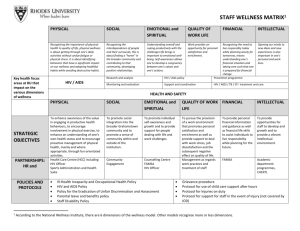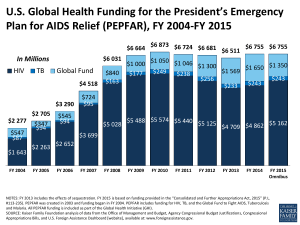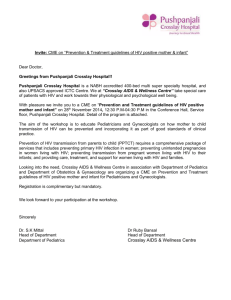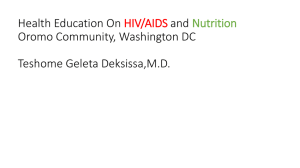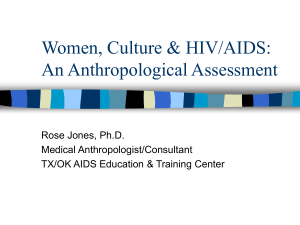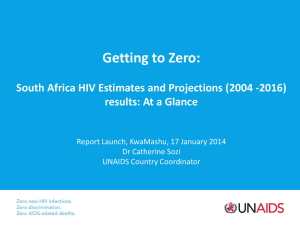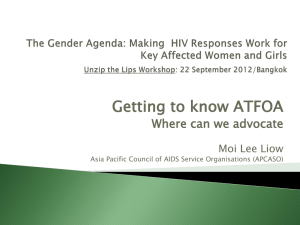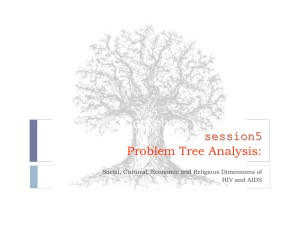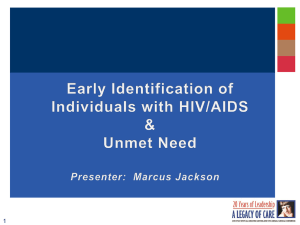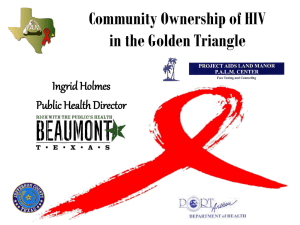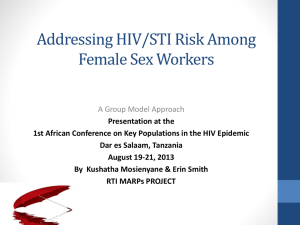Workplace Wellness Programme
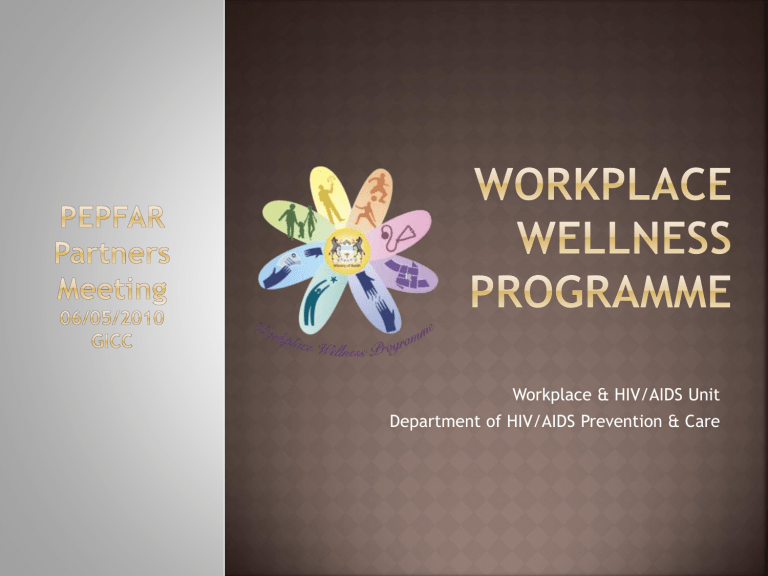
Workplace & HIV/AIDS Unit
Department of HIV/AIDS Prevention & Care
An initiative that dates back to 1990s
Health Workers the backbone of the health care system- forefront of prevention, treatment, care and support services
Impact of HIV/AIDS on Botswana Health Care System
-Increased physical and emotional demand on Health
Worker
-Emerging and re-emerging health problems impacting further on already over-stretched workforce
-Work environment a major source of stress, discontent and burnout for health workers
Health workforce a scarce resource with chronic shortages hence the TTR WHO initiative 2006
Health Workers seek services late due to fear, stigma and discrimination hence the WWP
2005/2006
MOH providing leadership and technical guidance with
PEPFAR support
Programme Coordinator appointed in 2005 (supported by
PEPFAR)
National steering committee in place for technical guidance
National needs assessment conducted in 2005
Sensitization of leadership at national and district level
Development of Programme’s 3 year plan
GOAL: To provide services and support to enhance the wellbeing and job-satisfaction of health workers in order to improve their emotional and physical health, prevent burnout, enhance staff retention and have a positive impact on patient care.
80
70
60
50
40
30
20
10
0
Available
Desired
2007
Facility Readiness Assessment conducted
Supportive structures in place to drive implementation o o o o
Operational Guidelines developed- minimum package services to be offered
Workplace Wellness Committees (18 hospitals, 3 headquarters units)
Quarterly reporting tool developed
Facility Support Visits conducted
Development of Health Promotion Materials
Development of Capacity Building Modules on Stress
Management, Occupational Health Safety, Death & Dying and Team Building o
Commenced Training of TOTs and Support Group Facilitators
Programme Materials
Handbooks
STRESS
MANAGEMENT
A Handbook for Health Workers
January 2008
TEAM
BUILDING
A Handbook for Health Worker
January 2008 s
Government of Botswana
Staff
Morale
A Handbook for
Supervisors and Managers
In Health Institutions
August 2007
Posters
Folders
Pens
Lanyards
Lephata la Botsogo
Botsogo jwa
Badiri
Ministry of Health
Wellness
Program for
Health
Workers
Brochures
Government of Botswana
Support Groups
For
Health
Workers
Journals
Capacity Building Modules
- Facilitator Manuals
- Participant Journals
- Facilitator’s Guide
- Member’s Guide
2008
Scaling up training at facility level on Stress
Management, Occupational Health Safety, and Team
Building including support groups
Launch of the Programme by the Honorable Minister of
Health
Held the First Annual National Review and Planning
Seminar Focal Officers opportunity for sharing Best Practices
Poster presentation of 2 Abstracts at the HIV/AIDS
International Conference in Mexico
Commenced development of M&E Framework
Developed Post Exposure Prophylaxis Algorithm
Hon. Minister of Health – Opening Remarks
MOH Staff
Hon. Minister of Health – Touring Wellness
Stalls
MOH Staff enjoying Healthy refreshments
MOH Staff – Aerobics Session WWP Launch – Organizing Committee
2009
TB/HIV Education and Care for high risk health care workers commenced in collaboration with BNTP, ARV and
Upenn. Infection Prevention and Control an integral component of this initiative
WWP contributed to the DHAPC website
Completion of ‘Facility Resource Toolkit’
Development of the ‘Daily Health Promotion /Inspiration
Book’
Development of Programme Logo
Recreation
Health screening
Treatment and care
Psychosocial support
Spiritual care
Capacity building
Lifestyle
Stress management
Statistical HIGHLIGHTS
Stress Management/Team Building/Occupational Health o
TOTs – 273 o
Managers – 84 (+ 20 I H S Managers on SM)
Support Group Facilitators – 190
Aerobics Instructor Training – 56
Monitoring & Evaluation – 70
TB/HIV – 2232, screened for TB - 941, screened for HIV -
535 (Dec 2009 for PMH, SEDC incl BLH, Kgatleng incl DRM) expansion ongoing to incl Kanye Nyangabgwe,SLH, Athlone etc
22/28 Hospitals plus MOHHQ, CMS, NHL offering wellness services (at varying levels of implementation)
49 Support Groups in 19 health facilities
15 Hospitals scaled up training to over 800 health workers
16 Hospitals have conducted annual wellness days
Over 400 Peer Educators trained
Continuation of capacity building scale up at facilities
Development of Workplace Peer Counsellor Manual
Evaluation of Peer Education
Dissemination of PEP Algorithm
Facilitation of training on infection control protocols
Scale up of TB/HIV Education and Care for high risk health workers
Development of target specific health promotion materials especially for youth, men and women
Quarterly technical support visits
Ministry of Health
